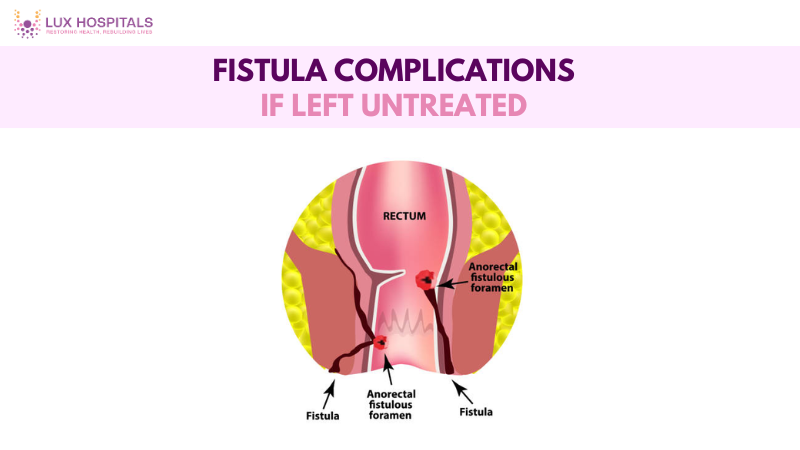Fistula Complications If Left Untreated: Risks, Causes, and Care

Infections have the capacity to worsen over time and spread to neighboring tissues, even though the symptoms may first seem minor. Sepsis and other systemic problems could result from this, and they could escalate into a medical emergency. impact on general well-being if ignored. Understanding the fistula complications if left untreated is crucial to prevent chronic pain, infections, and even life-threatening problems. This blog explores the risks in detail and explains why timely treatment is essential.
What Happens If a Fistula Is Not Treated?
Leaving a fistula untreated can lead to progressive health challenges. Although the symptoms may appear mild at first, infections have the potential to get worse over time and spread to nearby tissues. This could lead to systemic issues like sepsis, which could worsen into a medical emergency.
1. Chronic Infections
One of the most common complications of fistulas is recurrent infections. When bacteria travel through the abnormal opening, pus and fluid accumulate, leading to abscesses.
- Continuously bad-smelling fluid coming from the fistula opening
- Pain and swelling near the affected area
- Fever due to recurrent bacterial infections
Over time, untreated infections can weaken the immune system, rendering the patient vulnerable to recurring health issues.
2. Abscess Formation
Abscesses are pockets of pus caused by trapped bacteria. They are a direct consequence of untreated fistulas.
- Abscesses cause severe pain and tenderness
- They may burst and spread infection into nearby tissues
- If ignored, they can lead to septicemia (blood infection)
This makes abscesses one of the most dangerous fistula complications, requiring immediate medical drainage and antibiotics.
3. Sepsis (Blood Infection)
Sepsis occurs when infection from a fistula enters the bloodstream. It is a life-threatening emergency.
- High fever, chills, and rapid heart rate
- Low blood pressure leading to shock
- Organ failure in severe cases
When untreated, sepsis has high mortality rates. This illustrates the severity of fistula complications if left unaddressed.
4. Faecal Incontinence
In anal fistulas, the muscles that control bowel movements may be damaged. Over time, this can lead to faecal incontinence.
- Difficulty controlling bowel movements
- Constant leakage of stool or mucus
- Emotional stress and embarrassment
This condition significantly reduces quality of life, making it one of the most socially and physically distressing fistula complications.
5. Tissue Damage and Scarring
Recurrent infections from untreated fistulas can harm the surrounding tissues. Passages get narrowed and scarred as a result.
- Long-term difficulty in healing
- Chronic pain due to scar tissue
- Increased chances of fistula recurrence even after treatment
Such tissue changes underscore the importance of early medical attention for fistula complications.
6. Malnutrition and Weakness
Nutrient absorption is hampered by certain fistulas, including gastrointestinal fistulas. Over time, this results in severe malnutrition.
- Weight loss and muscle weakness
- Vitamin and mineral deficiencies
- Increased fatigue and poor wound healing
Malnutrition further impairs the body’s defenses against infections, which makes managing fistula consequences more difficult.
7. Skin Irritation and Ulceration
Constant leakage from a fistula irritates the surrounding skin. This may cause ulcers, rashes, and secondary skin infections.
- Persistent itching and burning sensation
- Painful sores around the affected site
- Increased risk of bacterial and fungal infections
Chronic skin damage adds another layer of discomfort to the list of fistula complications.
8. Risk of Cancer Development
Although rare, untreated fistulas—especially long-standing anal fistulas—can increase the risk of cancer.
- Persistent inflammation damages healthy cells
- Anal or colorectal cancer may develop in chronic cases
- Regular medical follow-ups are required for high-risk patients
This makes early treatment vital to prevent one of the most severe fistula complications.
9. Emotional and Mental Health Impact
Untreated fistulas create a great deal of emotional distress in addition to physical problems. Patients frequently experience depression, shame, and anxiety.
- Constant worry about leakage and odour
- Social disengagement brought on by discomfort
- Reduced confidence in personal and professional life
Because of these psychological repercussions, fistula issues are not just a physical health issue but also a holistic one.
Why Timely Treatment Is Essential?
Ignoring fistulas is never a safe option. Early treatment prevents infections, restores normal function, and improves quality of life. Treatment options include:
- Medications: To control infection and inflammation
- Surgery: Such as fistulotomy or seton placement
- Lifestyle management: Including proper hygiene and nutrition
By treating the condition early, you can avoid severe fistula complications and lead a healthier, pain-free life.
Conclusion
Fistulas may seem like a minor health issue at first, but ignoring them can lead to dangerous and sometimes life-threatening outcomes. From chronic infections and abscesses to sepsis, incontinence, and even cancer, the list of fistula complications highlights why timely medical care is essential. Early diagnosis, proper treatment, and lifestyle management not only prevent severe health risks but also improve quality of life. At Lux Hospitals, our expert proctology team specializes in diagnosing and treating various types of fistulas with advanced techniques to ensure faster recovery and long-term relief. If you notice persistent symptoms, consulting a healthcare professional at Lux Hospitals can save you from long-term suffering and restore your overall well-being.
Frequently Asked Questions
If a fistula is not treated, it can lead to chronic infections, abscesses, and even sepsis. Over time, it can damage tissues and cause incontinence. In severe cases, untreated fistulas may even increase the risk of cancer.
Most fistulas do not heal on their own because the abnormal passage remains open. While some minor cases may experience temporary improvement, recurrence is a common occurrence. Surgery is often necessary to permanently resolve the issue and prevent fistula complications.
A fistula itself may not be life-threatening, but the complications can be. Sepsis, severe infections, and malnutrition make it dangerous if left untreated. With timely treatment, the risks are significantly reduced.
If you experience persistent pain, discharge, or fever, it may indicate worsening complications of the fistula. Swelling, abscess formation, or uncontrolled leakage are red flags. Seeking medical advice early prevents long-term damage.
Yes, persistent, untreated fistulas, particularly those in the anal or rectal area, may raise the chance of developing cancer. Chronic inflammation can harm healthy cells, which can result in cancer. Frequent examinations aid in the early detection of alterations.




















